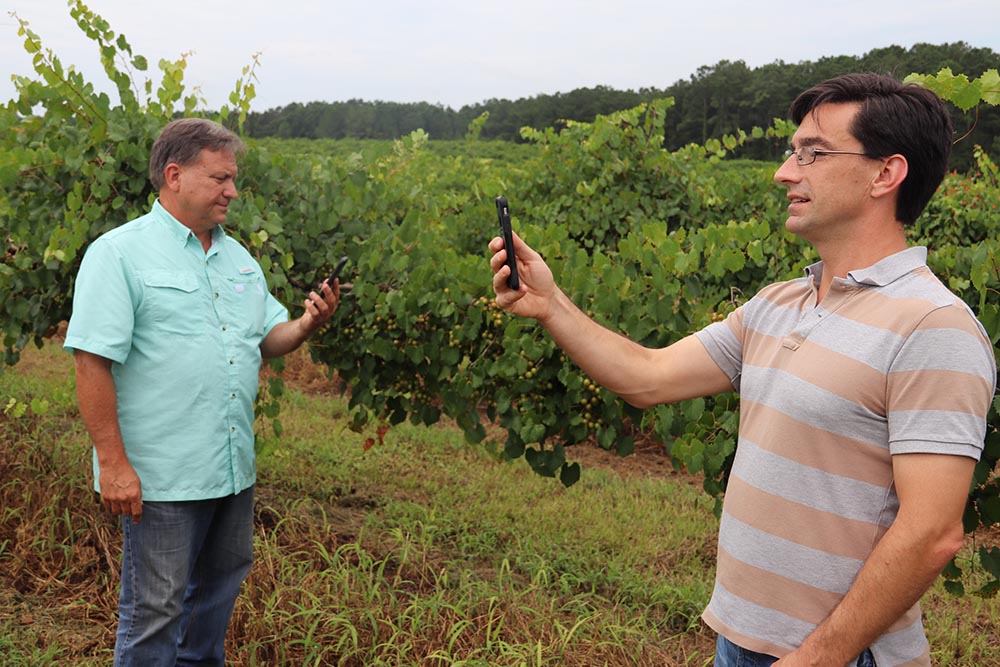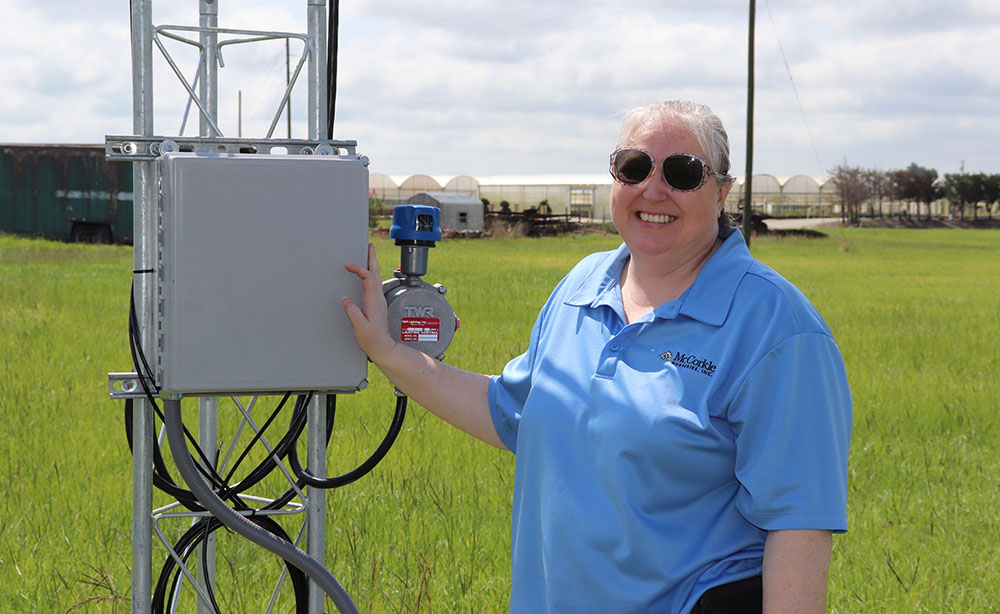GFB News Magazine
The farmers’ disconnect: Slow or no internet a constant headache
Posted on August 3, 2018 12:00 AM
By Jay Stone
A radio commercial from the early 2000s centered on two grandparents downloading a picture of their grandchild. Grandma remarks how cute the child is. Grandpa points out all they can see is the top of the baby’s forehead, the result of a glacial download speed.
Exasperated, he says, “I’m going to take a nap. Wake me up when the kid’s got a neck.”
In some ways, rural America is still waiting for the kid’s neck to show up. Internet usage has spread into virtually all aspects of life, and residents of rural Georgia are feeling the pain of lack of broadband access. Farmers are emphatic this needs to change because it is hurting their bottom line.
“This is the rural electrification issue of our time,” said Chris Paulk, who runs Paulk Nurseries with his father, Irwin County Farm Bureau President Gary Paulk. “It’s an absolute necessity.”
The Paulks grow muscadines and blackberries that must be harvested by hand, which means they have to hire migrant laborers. Under Georgia law, they are required to check the immigration status of every worker they employ using the federal E-Verify system that matches workers’ information with records at the Social Security Administration and the Department of Homeland Security.
The Paulks and other farmers in rural areas hit a roadblock before they can log into E-Verify: Slow or nonexistent internet.
“You can’t do E-Verify without the ‘E,’” Chris said, noting that the farm needs workers in the field when the fruit is ready to pick. “It could be a couple hundred people that week that you need to verify, and you don’t have six months to do it. You’ve got about six hours to process all these people.”

In Irwin County, Gary (left) and Chris Paulk of Paulk Vineyards search for a signal.
So, Chris goes into town, finds an establishment with Wi-Fi and camps out for hours while working on the E-Verify documentation.
And that’s just one task that hinders farmers whose internet connection – if they have one – cannot handle the data. For farmers, a few of the activities limited by internet connectivity and capacity include sales and inventory, centralized control of machinery, using remote cameras to monitor crops/livestock, and attending educational webinars.
The Paulks are in eastern Irwin County 15 miles from the county seat, Ocilla. They were able to get the local internet service provider, WindStream, to run a dedicated line from Ocilla to their farm office. Chris said it is slow – usually around 3 megabits per second (mbps) – and that capacity is divided among all the connected devices in the office.
Using broadband-enabled smartphones is cost prohibitive because of the cellular service providers’ billing structure based on data usage. Even if it weren’t, the cellular coverage on the Paulk's farm is spotty.
Because the Paulks sell fruit for human consumption they have to comply with federal food safety regulations. Those workers have to be trained on food safety practices during harvest, and providing that training through web-based video would be ideal, if the Paulks could do it. They can’t.
Another thing they can’t do because of their extremely limited internet capability is process credit or debit card transactions at their roadside market.
“We can only take checks and cash,” Gary said. “I have to tell them, ‘We can’t run your card.’”
Direct-to-consumer challenges
Jaemor Farms in Hall County has also faced challenges with internet connectivity. According to Jaemor Agritourism & Marketing Coordinator Caroline Lewallen, high-speed fixed internet ends a couple of miles away, leaving the farm to conduct its online activities using a series of cellular wireless hot spot devices. Those, she said, can be affected by weather.
“Any type of size of agribusiness not having reliable internet is certainly a big issue if you’re doing online marketing,” Lewallen said. “Not to mention any online sales or just answering customers’ questions. If I don’t have reliable internet, I can’t be a resource to our customers. I can’t do any scheduling that needs to be online with school systems to get them to the farm. No internet can be a real headache.”
Jaemor’s on-farm store also faces issues with processing credit or debit card payments to complete direct-to-consumer sales.
“We have a back-up,” Lewallen said. “We can put it into our phone lines, but that makes it extremely slow. On a busy Saturday in October, we need as fast a checkout line as we can have.”
Lewallen faces a double whammy of internet challenges. She and her husband, Kyle, are starting an online direct-to-consumer beef business. This fall, they plan to have a trial run, selling their beef online and making it available for customer pickup at various drop spots.
Their plan calls for marketing through social media, and they’ll accept payments through an online portal. Their farm is in rural Habersham County where the internet access options are limited to the point that they asked about paying to have a fiber optic cable run to their farm. The price tag? More than $100,000.
“We just bought the land and the equipment,” Lewallen said. “The last thing we need is another expensive bill.”
The Lewallens settled for using a satellite connection at $250 a month. It presents the possibility of outages during inclement weather.
“We’re frustrated because we wanted to farm, we have the opportunity to farm,” Lewallen said. "We’ve taken all these steps, and yet in order for us to get a sale, win a customer, if we don’t have the internet, we may have to throw the business plan out the window and start something else. Rural America deserves better.”
Internet of things
An emerging trend in internet applications is the “internet of things,” which gives users the ability to control devices in a distant location. For residential users, it might mean using their smartphone to adjust the thermostat at home, answer the door or turn an appliance off.
In a business setting, the ability to use distant devices from a computer or phone is a powerful time management tool.
At McCorkle Nurseries in McDuffie County, the constraints of the farm’s internet service limit what tasks can be done. Information Technology manager Denise Jordan would like to have cameras on all of the nurseries’ 1,000 acres of production so one person could monitor them from the office rather than spending hours riding around the property to see if plants need water or are being damaged by insects or disease.

In McDuffie County, McCorkle Nurseries IT Manager Denise Jordan with a communications control box on one of the nursery’s farms.
The nursery has multiple irrigation pumps. One of the pumps can be controlled remotely, but Jordan would like to control all of them remotely to save the labor of turning them on and off by hand. Keeping track of the nursery’s inventory – tens of millions of plant pots - is another massive job Jordan would like to make automated.
“You have to have wireless connections to be able to get those kind of counts,” Jordan said. “A lot of the software packages we’re looking at upgrading to have those capabilities, but a lot of them want some form of cloud integration. As soon as I hear that word, I’m like, ‘OK, never mind.’ ”
McCorkle’s has offices in Cobb County, Gwinnett County and Piedmont, South Carolina, where sales staff meet face-to-face with potential customers. It’s a great help for a sales person to be able to show the plants in real time.
“It is an awesome sight when this place starts blooming,” Jordan said. “I’d like to get some cameras out to some of our nursery beds, so that when this bed of whatever kind of flowering plant is in bloom, our salesmen can show that.”
Additional Information
From September 2016 to May 2017, the Georgia Broadband Center, part of UGA’s Carl Vinson Institute of Government, surveyed more than 12,000 Georgians to gauge their access to high-speed internet to a fixed location like a residence. Of those, 61 percent said they were unable to purchase the broadband speed they need. Sixteen percent responded that they could not get wireline service. More than 96 percent said they felt broadband access is important to quality of life, and more than 80 percent indicated broadband access is important to earn a living.
The Georgia House Rural Development Council (RDC), charged with searching for ways to stem the movement of people from rural to urban areas, concluded that access to broadband – “always on” internet with faster transmission speeds than dialup – is one of the key points of improvement needed to promote rural prosperity.
In its 2017 report, the RDC noted, “building out [broadband] infrastructure is fundamental to all other issues challenging rural Georgia and may partially provide solutions … for businesses to compete and respond in a global market.”
To view the RDC’s recommendations, visit http://bit.ly/HRDCreport. The broadband recommendations are on page 5 of the report.
“What we want is some semblance of reliable and some semblance of high speed, something that’s up 24 hours a day, 7 days a week, 365 days a year on a predictable basis,” said RDC Co-Chairman Terry England (R-Auburn).
The Federal Communications Commission (FCC) considers download speeds of 25 megabits per second as high speed. That’s fast enough to stream multiple high definition programs and have multiple people using the internet connection without interruption.
The RDC noted that the Georgia Electric Membership Cooperatives (EMCs) could be a major part of any expansion of internet service. England said it’s unclear what role EMCs can have in providing broadband to customers. Cable and telecommunications providers, England said, oppose allowing EMCs to offer broadband, viewing that approach as unfair competition because of EMCs’ access to low-interest loans.
“The EMCs in the state run a wire into every building in rural Georgia,” England said. “Why would they not be the ultimate partner, then, to be the one to provide that high-speed broadband Service?”
The RDC recommended the establishment of a relationship with the EMCs pertaining to broadband access in statute.
In addition to the RDC’s recommendations, there is legislative movement at the state and federal level to address the scarcity of broadband access in rural areas:
• In May, Georgia Gov. Nathan Deal signed Senate Bill 402 (http://bit.ly/GASB402) into law which provides for planning, deployment and incentives of broadband services statewide.
• In January, President Donald Trump signed an executive order intended to promote growth of rural broadband access.
• The Senate farm bill includes a provision that would prioritize funding for broadband development to areas that have no existing residential broadband service.
• In 2017, U.S. Rep. Doug Collins introduced the Gigabit Opportunity Act (H.R. 2870; http://bit.ly/CollinsGOAct), which would provide tax incentives for investments in high-speed internet in low-income communities.
This is the fourth installment in a five-part series on rural prosperity in Georgia. Previous installments centered on healthcare (www. gfb.ag/ruralmed), education (www.gfb.ag/ lessonplan) and workforce (www.gfb.ag/ agworkforce).